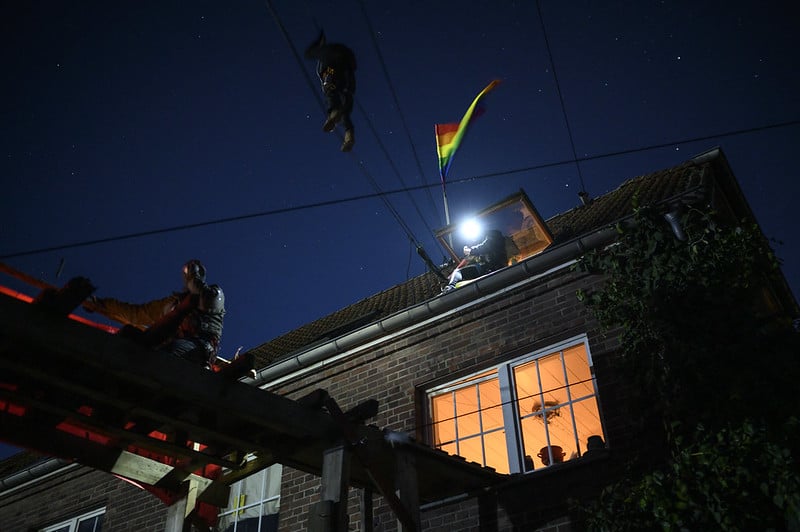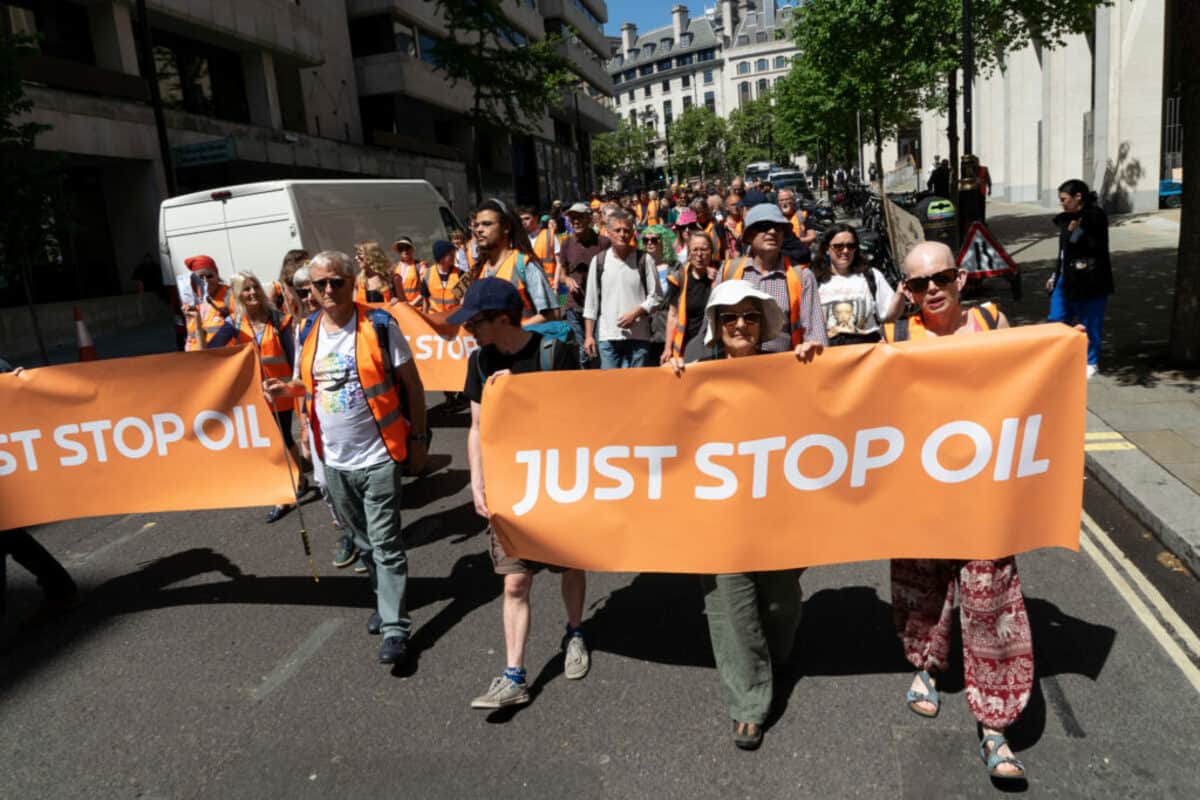In the first of a two-part series on Lützerath, Lexy Ray shares their deep connection with the village lost forever to a coalmine
January 10th, 2023: Night has already fallen upon the small village of Lützerath. Small spots of light are dancing in the dark as people scurry around with their headlamps, preparing for the eviction. Care is needed to navigate the maze of wood, steel and brick barricades. Small fires are burning on the ground, softening the asphalt in preparation for concrete foundations. The flames and the faint smell of tar smoke create a somewhat apocalyptic atmosphere. At the village entrance, activists of “Kirchen im Dorf lassen“[1] are holding a prayer. They know very well that it will be their last service at the outdoor chapel beneath an old yew tree. The actual doom of Lützerath is already visible, approaching from only a few hundred yards away: the paddle-wheel of a coal excavator peeking over the edge of the pit mine and the brightly lit siege camp with endless rows of parked police vans. You can feel a subtle tension vibrating in the quiet air – the calm before the storm.
Over the course of the last two and a half years, climate justice activists have re-populated the village 20 miles west of Cologne. What started as a small vigil in the summer of 2020 has since grown into a complex social organism. By and by, this community has squatted the remaining buildings and constructed new wooden homes in the trees and on the meadows. Some have found a permanent home here, others a temporary refuge from the constraints of their “normal life”. On the eve of the eviction, several hundred protesters have arrived in order to defend Lützerath.
The next morning, police troops come rushing in with full force. Many activists are overwhelmed and shocked by the sudden attack, after a few days of calm;. Some try to hold their ground on the streets, behind the barricades – but they are soon outnumbered and chased away, or caught. Most people play defensive anyway, withdrawing to the secure height of a tree-house or behind the barricaded door of a squat. By noon, the police have gained full control of the ground. Meanwhile, RWE workers are already erecting a one-mile fence around the village. Special police forces come in and begin to pick people off the trees, platforms and rope bridges. Technical units break into the buildings and dismantle lock-ons. Heavy machines clear away the barricades. With so many resources at their disposal, the police manage to evict a large number of structures on the first day. Protesters who refuse to reveal their identity are subjected to some identification measures in the police camp, but only a few people are taken into detention. It seems as if they just want us out of the way, outside the fence.
The eviction’s unexpectedly fast progress is pressing on the collective mood. Some voices had been sceptical from early on, arguing that the eviction of Lützerath would be quicker than those of the large “Hambacher” and “Danneröder” forest occupations. The village is geographically much more concentrated, exposed and accessible, compared with a forest. However, few people expected it to be quite so quick. Our own disappointment is mirrored in the media reports describing a successful police operation and the surrender of activists.
On the following day, somebody draws an ace out of their sleeve: a video is published online, revealing the existence of a tunnel that almost nobody knew of before. The dry humour of those two subterranean villagers in the video is already lifting the spirits. Above that, it is clear that the tunnel will slow down the eviction of the surrounding tree-houses significantly, as it blocks access for heavy machinery. The tide seems to be turning as the tunnel-video goes viral.
Those who have been evicted join the supporters in the camp in the neighbouring village. Here, they can find some space to rest and regenerate. My affinity group is all snuggled up in a dry and somewhat warm camper van. We share our stories, our feelings and our laughter. At first it is hard to acknowledge our disillusionment, but soon, fresh hope is rising up. Small demonstrations have tried to reach the fence every day, even though they were kettled by the police ahead on the fields. Rumour has it that some people are gathering bolt cutters and disc grinders for breaking through the fence at the big demonstration on the weekend.
Roughly 30,000 demonstrators show up on Saturday; buses arrive from all over Germany and local train lines are congested with people. The police have limited the demonstration to a short route and a final destination presumably a safe distance away from Lützerath. Speaker Peter Donatus talks about his experience fighting Shell in Nigeria and concludes with the necessity of civil disobedience: he openly calls upon the crowd to defy police orders and to “storm the fence”. Small groups begin to push through the police lines which tightly line the road side. Eventually, the police has to retreat. Thousands follow the collective movement over muddy fields towards the besieged village. Most of them are regular, middle-class people with a sense for ecological issues, but not radical activists. Their transgression beyond the legally approved demonstration route, beyond “politics-as-usual” is already a huge success.
Circled by the masses, the fence seems a little less intimidating. Still, those up front are facing a severe obstacle: one line of police forces, one line of parked vans, two lines of metal fencing, stabilised by massive steel elements. They got the crowd covering their back, but any attempt to reach the fence is answered by brute violence. The paramedics will later report dozens of serious injuries. Only one particularly athletic protester manages to get into Lützerath that day, leaping over the fence in a moment of police carelessness. However, the victorious breakthrough remains a fantasy.
Once more, things didn’t quite take the course we hoped for. It’s obvious that we missed the last somewhat realistic chance to actually defend Lützerath. On Monday, the tunnel inhabitants voluntarily leave their hideout after the police have handed over responsibility for their eviction to RWE workers; they can’t be trusted to do the job safely. With their departure, the occupation has definitely ended. A final day of decentralised actions with multiple blockades on roads, railways and in the mine sends out a clear sign: Lützerath may have fallen, but the struggle against coal mining and for climate justice is far from being over.
Back in the camp, the action point tent has been turned into a dancefloor. Bolt cutters and megaphones hang from the ceiling as a makeshift party decoration. People are sitting by the campfire, singing songs of rebellion. There is lots of laughter around. At this point, it becomes clear to me that Lützerath was more than just a place. It was, more than anything, a community. A web of relationships that was spun on the loom of this tiny village, but which doesn’t cease to exist now that the farms and tree-houses are gone. Suddenly, all the emotions which have been covered up by adrenaline for many days finally surface into my body.
I feel pain and grief over the loss of this beautiful, vibrant place.
I feel regret for having forgotten Lützearth’s beauty sometimes, for not having spent more time here when it was still possible.
I feel gratitude for the sense of connectedness and comfort that the people are giving me here, especially my affinity group.
I feel fear that that these bonds will fade and fray, that the community will disperse with its physical core gone.
I feel lonely, or rather anxiously anticipate a future loneliness.
I feel rage and fury towards the police, who obviously had to do their job, but in some cases decided to do it inhumanely and irresponsibly.
I feel admiration for our collective strength, for how we dared to dream big and simply tried to make it happen.
I feel trust that these eviction days have helped the movement to grow.
I feel hope.
I feel relief.
Photo credit: Tim Wagner
[1]Literally: ‘leave the churches in the village’, also a German proverb meaning ‘to keep something down to earth’. Here: a political group of Christians struggling to protect the churches in those villages threatened by the coal mines.
🖋 Sign up for direct action at bit.ly/JSO2023
Support us at bit.ly/JSOdonate3
🌡 Learn more about the campaign at bit.ly/JSOevents
#FreeLouis #CivilResistance #A22Network #JustStopOil #NoNewOil #NoNewCoal #EnoughIsEnough #ClimateCrisis #ClimateChange #CostOfLivingCrisis #CostOfGreedCrisis #UK #Government #FossilFuels #CivilDisobedience




